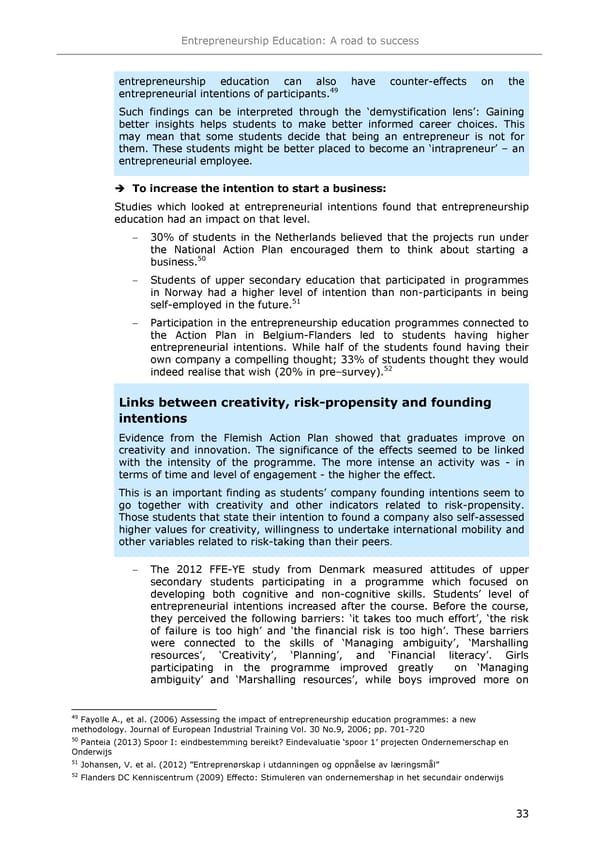Entrepreneurship Education: A road to success entrepreneurship education can also have counter-effects on the 49 entrepreneurial intentions of participants. Such findings can be interpreted through the 8demystification lens9: Gaining better insights helps students to make better informed career choices. This may mean that some students decide that being an entrepreneur is not for them. These students might be better placed to become an 8intrapreneur9 3 an entrepreneurial employee. To increase the intention to start a business: Studies which looked at entrepreneurial intentions found that entrepreneurship education had an impact on that level. 30% of students in the Netherlands believed that the projects run under the National Action Plan encouraged them to think about starting a 50 business. Students of upper secondary education that participated in programmes in Norway had a higher level of intention than non-participants in being 51 self-employed in the future. Participation in the entrepreneurship education programmes connected to the Action Plan in Belgium-Flanders led to students having higher entrepreneurial intentions. While half of the students found having their own company a compelling thought; 33% of students thought they would 52 indeed realise that wish (20% in pre3survey). Links between creativity, risk-propensity and founding intentions Evidence from the Flemish Action Plan showed that graduates improve on creativity and innovation. The significance of the effects seemed to be linked with the intensity of the programme. The more intense an activity was - in terms of time and level of engagement - the higher the effect. This is an important finding as students9 company founding intentions seem to go together with creativity and other indicators related to risk-propensity. Those students that state their intention to found a company also self-assessed higher values for creativity, willingness to undertake international mobility and other variables related to risk-taking than their peers. The 2012 FFE-YE study from Denmark measured attitudes of upper secondary students participating in a programme which focused on developing both cognitive and non-cognitive skills. Students9 level of entrepreneurial intentions increased after the course. Before the course, they perceived the following barriers: 8it takes too much effort9, 8the risk of failure is too high9 and 8the financial risk is too high9. These barriers were connected to the skills of 8Managing ambiguity9, 8Marshalling resources9, 8Creativity9, 8Planning9, and 8Financial literacy9. Girls participating in the programme improved greatly on 8Managing ambiguity9 and 8Marshalling resources9, while boys improved more on 49 Fayolle A., et al. (2006) Assessing the impact of entrepreneurship education programmes: a new methodology. Journal of European Industrial Training Vol. 30 No.9, 2006; pp. 701-720 50 Panteia (2013) Spoor I: eindbestemming bereikt? Eindevaluatie 8spoor 19 projecten Ondernemerschap en Onderwijs 51 Johansen, V. et al. (2012) =Entreprenørskap i utdanningen og oppnåelse av læringsmål= 52 Flanders DC Kenniscentrum (2009) Effecto: Stimuleren van ondernemershap in het secundair onderwijs 33
 Entrepreneurship Education Page 36 Page 38
Entrepreneurship Education Page 36 Page 38